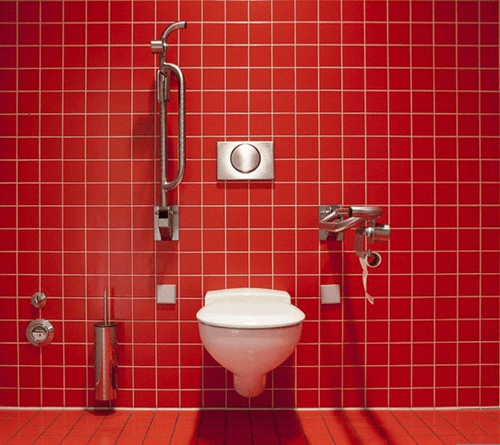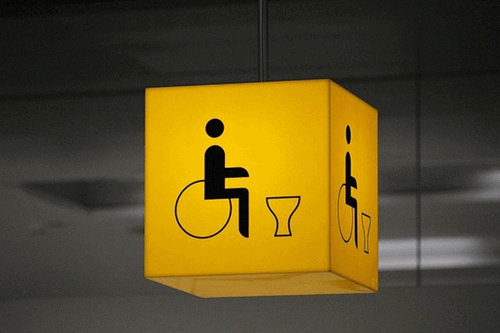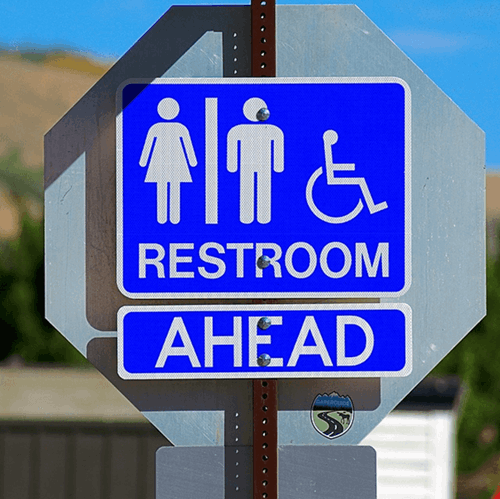As an employer, it's nearly impossible to track how many times employees take 'loo breaks' per day. But that doesn't mean you should start imposing restrictions on their bowel movements.
Employers cannot stop workers from taking a toilet break. However, you can manage the number, length, and impact these breaks have on your business.
In this guide, we'll look at what toilet breaks at work are, UK laws statutory rest breaks, and how to manage longer toilet breaks than necessary.
What are toilet breaks at work?
A toilet break at work is a rest period taken when an employee wishes to use the restroom.
'Using the loo' is considered a basic human function; and helps us operate on a daily basis. Employees also take them to gain a 'moment of calm' during hectic work days.
The odd trip to the bathroom after lunch or before home time is not generally problematic. But in some cases, employees who take prolonged toilet breaks can result in a drop in productivity.
When employers place restrictions on toilet breaks, it needs to be done with thought. It's so important to create a good balance between human needs and business impacts.

What happens if you impose toilet break restrictions?
It's important not to avoid imposing toilet break restrictions without reason or care.
A lack of access to sufficient toilet breaks can result in serious health conditions. If you restrict toilet breaks, it could lead to digestive issues, urinary tract infections, and kidney infections.
Restricting toilet breaks could risk an employee's health in several ways. For example:
- Medication: Those who take particular medication may take additional toilet trips.
- Menstrual cycles: Employees on their periods are more likely to use the toilet more, over the three to seven days of ovulation.
- Menopause: Common symptoms of menopause revolve around the bladder and digestive system.
- Prostate: Employees with prostate problems are likely to go to the bathroom more, as they manage their urinary systems.
In colder work environments, like construction sites or food storage facilities, employees often have a higher need for urination.
In these cases, make sure all employee health requirements are met; and be empathetic when it comes to such breaks.

UK employment laws protecting toilet breaks for employees
There are no specific employment laws protecting toilet breaks in the UK. However, there are certain consequences if you restrict toilet breaks.
Under the Working Time Regulations 1998 (WTR), you must provide a statutory rest break period of 20 minutes for all adult workers. This is strictly for those who work more than six hours per day.
Employers could decide to constrain a daily toilet break to this period. However, it's best to highlight your decisions through your rest breaks policies. Be reasonable - think about what the job is, how long it takes, and other impeding factors for a particular job.
Toilet break allowances for pregnant employees
Pregnant workers often take toilet trips more than others. This is because, as the baby grows, it pushes down on the uterus, causing the need to urinate more than normal.
Pregnancies are considered temporary medical conditions; it's highlighted as a protected characteristic under the Equality Act 2010.
This means you cannot discriminate against pregnant employees for taking excessive toilet breaks. Instead, help them by making reasonable adjustments to their work environment. For example, you can assist pregnant employees by moving their workspace closer to your washroom facilities. This shortens the distance between going and coming back from the bathroom.
Neglecting this legal right could affect employees during sensitive times. Negligence and malpractice could result in employees leaving their job after their maternity leave.
Toilet break allowances for employees with disabilities
If an employee suffers from a disability (physical or mental health issues), they might require longer toilet breaks.
Allow them to state whether they specifically require additional breaks. Invite them to explain their situations - comfortably and confidently.
Any employee with a disability diagnosis must receive reasonable adjustments. These are changes made to their work conditions or obligations.
For example, when it comes to spending frequent toilet breaks, allow them access to their own facilities. Remember, they might need further time getting to the bathrooms, as well as additional steps after using the facilities.
If you fail to provide legal rights, employees could raise discrimination claims to employment tribunals. Here, you could end up dealing with business damages and compensation penalties.

How to manage toilet breaks at work
When it comes to 'toilet' needs, it might not be the most comfortable of conversations. Some employees might be unable to express their concerns, out of embarrassment or worry.
That's why it's important to manage toilet break issues at work. From rules to facilities - make sure you cover all aspects when it comes to these additional rest breaks.
Here are steps on how to manage toilet breaks at work:
Create a toilet-breaks policy
The first step you can take is to create a toilet-breaks policy.
These are guidelines which state your rules on toilet breaks, when they can be taken, and the consequences for misusing them.
Employees can refer to the policy for more information on what constitutes a toilet break. For example, whether they can take smoke breaks instead of toilet breaks. Or which specific bathroom facility is available for them, like gender-neutral bathrooms.
These rules may also be added to an employee's contract, handbook, and other company policies.
You can also highlight any reasonable restrictions for taking excessive toilet breaks (longer than the average person). Don’t impose restrictions within your rest breaks policy; be fair with your rules. And make sure everyone in the company has access to it.
Manage rest break misconduct
Along with information, your policy can also highlight how rest break misconduct is dealt with.
If an employee appears to be taking lengthy toilet breaks or misusing their entitlements, take appropriate disciplinary action. They need to be aware of the consequences of such misconduct.
You should avoid restricting access completely. Or actioning demotions or dismissal, as these must only be used as a last resort or through a reasonable restriction.
Make distinctions between rest breaks and toilet breaks
You need to make a clear distinction between the different types of breaks you offer. Lunch, tea, or smoking breaks - make sure you clarify how breaks are categorised.
Choose an appropriate time for employees to take bathroom breaks. Remember, breaks should not be taken at the very start or very end of shifts.
Decide whether employees must only make toilet visits during their statutory rest break. Or whether employees are allowed to take separate toilet breaks without hesitation.
They may decide to eat, nap, or make personal calls on their mobile phones during breaks. Here, employers do not have direct supervision or control over how staff spend their statutory breaks. (You can impose restrictions if their behaviour affects business output or reputation).
Designate appropriate facilities for bathroom breaks
Potential candidates and employees may react poorly if they discover a lack of washrooms. That's why it's important to designate appropriate facilities - allowing workers to take bathroom breaks within reason.
For example, if an employee needs to walk 10 minutes to adequate facilities, this will directly impact working hours, production, and turnaround.
Consider providing appropriate facilities like:
- Having a designated washroom facility on site.
- Provided appropriate toiletries, like toilet paper, hand-wash, and soap.
- Ensure ventilation, heating, and water systems are sufficient.
- Keep the bathroom furniture, like basins and toilet seats, in good condition.
Provide toilet breaks to all workers
It’s important to present toilet breaks to all workers - both internal and remote.
Remember, they are considered under your legal duty of care. So, make changes and rules that are deemed reasonable for them.
Consider tailoring them to their work duties, tasks, and shift patterns. In some cases, they might be entitled to additional breaks or compensatory rest due to the nature of their jobs
Avoid imposing restrictions simply because they are not full-time staff members. For example, zero-hour contract workers are entitled to the same rest break rights as other workers.
Shift workers are not legally entitled to full legal breaks within a working day or week if:
- They change shift patterns from day to night.
- There isn't sufficient time to take a full rest break.
Make sure these workers don't skip or restrict breaks onto themselves. Support their welfare and minimise work-related burnout and stress. This helps avoid any legal risk to an employer's health and safety duties for both part-time and remote workers.
Protect employee wellbeing and morale
Whilst it's not a legal obligation, having toilet breaks can protect employee well-being and morale.
Providing additional breaks may allow employees to work in more comfortable conditions. This, in turn, boosts employee performance and loyalty - resulting in increased production and revenue.
If there are no imminent issues with production and output, you might not need to impose toilet breaks rules. If you initiate unfair rules, you could end up with poor workforce morale. This can result in high levels of employee turnover, potentially leading to reputational damage on the business.

Get expert guidance on toilet breaks at work with Croner
Whether other employers place restrictions on toilet breaks at work or not, you need to do what's best for your workplace.
Comply with every relevant employment law on rest breaks as a start. From there, you can implement the best guidelines on how to provide toilet breaks at work.
Croner has a full team of HR experts who can help your business manage these additional, unexpectant rest breaks.
For further assistance, call out 24/7 HR advice line today on 01455 858 132.
Related resources
Categories
- Business Advice
- Contracts & Documentation
- Culture & Performance
- Disciplinary & Grievances
- Dismissals & Conduct
- Employee Conduct
- Employment Law
- End of Contract
- Equality & Discrimination
- Health & Safety
- Hiring & Managing
- Leave & Absence
- Managing Health & Safety
- Moving
- Occupational Health
- Pay & Benefits
- Recruitment
- Risk & Welfare



